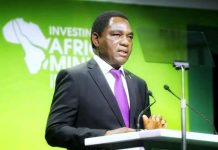Africa-Press – Zambia. Economist and former Economics Association of Zambia (EAZ) President Dr. Lubinda Haabazoka has raised alarm over Zambia’s disconnect from emerging global economic opportunities, warning that the country’s inward-looking policies and uncoordinated development strategies could cost it a place in the rapidly evolving international trade landscape.
In a candid reflection shared on June 21, 2025, Dr. Haabazoka lamented Zambia’s lack of strategic alignment with global trends, pointing to the missed opportunities in key export markets, especially in agriculture and energy.
The economist, who recently attended a high-level global summit featuring Russian President Vladimir Putin and top international investors, said Zambia’s national discourse and economic priorities remain “petty and detached from global realities.”
“We are not in sync with global realities. We are petty and in urgent need of a national development master plan,” Dr. Haabazoka emphasized.
He revealed that while other countries are aggressively positioning themselves for mutually beneficial partnerships with emerging global powers, Zambia remains passive and reactive. He cited the example of Bahrain, which has positioned itself as a hub for Russian wheat trade, while Qatar is launching a sovereign wealth fund to back joint projects. The UAE, meanwhile, is eyeing dominance in hydrocarbon distribution.
“These nations are locking in long-term economic gains through strategic partnerships. What are we doing? We are debating subsidies and partisan appointments while opportunities pass us by,” he added.
Dr. Haabazoka was particularly concerned about Zambia’s waning trade relationship with neighboring Democratic Republic of Congo (DRC), once a primary export market. He noted that DRC has diversified away from Zambian poultry and agricultural products, opting instead for more consistent suppliers.
“We’ve lost Congo because they’ve diversified away from us,” he stated, proposing a pivot toward targeted production for known markets: pork farming for China, poultry for Congo, and wine or fruit exports for new markets.
In response, economic analysts agree that Zambia’s failure to develop a clearly articulated export-led industrial strategy is a serious hindrance to national development. While other countries are integrating into supply chains and forming strategic export hubs, Zambia is still debating basic production logistics without sector-specific roadmaps.
Haabazoka laid out a clear framework for transformation: “We need to identify: where to produce, who will produce, who will fund, how they will produce, for whom, and how they will sell.”
He stressed that vague policy statements must give way to clear, actionable plans, grounded in current global demand trends and supported by real investment incentives.
Experts say Zambia must act fast to reposition itself. With rising global demand for alternative suppliers of energy, food, and raw materials especially in the wake of shifting geopolitical alliances Zambia has an opportunity to carve a niche in targeted sectors such as agriculture, mining value addition, logistics, and green energy.
However, this requires moving beyond generalized economic rhetoric and toward implementation-focused strategies backed by research, public-private partnerships, and regional market intelligence.
Dr. Haabazoka’s remarks echo a growing sentiment within Zambia’s business community: that the country must reframe its development model to become more export-driven, specific in its planning, and aggressive in seizing global market opportunities.
With the world economy undergoing realignment, Zambia’s next steps could determine whether it emerges as a strategic player or is left behind once again.
June 21, 2025
©️ KUMWESU
For More News And Analysis About Zambia Follow Africa-Press







